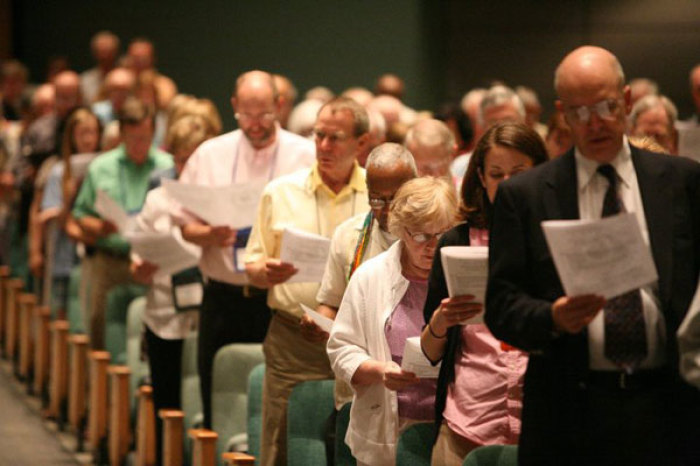Texas Megachurch's Cave on Property Battle May Hurt Other Congregations Considering Leaving PCUSA

A decision by Highland Park Presbyterian Church of Dallas to pay Presbyterian Church (USA) $7.8-milion for a building that the congregation built in the 1920s, nearly 60 years before it joined PCUSA, may strand countless other congregations as they struggle with leaving PCUSA over its policy of allowing non-celibate homosexuals to marry and be in leadership.
HPPC agreed to a settle in a court case that sought to challenge PCUSA's strong assertions that it owns all property under "trust" if a congregation joins the denomination. The position has become a central battleground for churches struggling with PCUSA's progressive positions on homosexuality.
Despite getting an initial injunction in their favor as well as a date in October for a hearing, last week Highland Park and Grace Presbytery reached a settlement wherein the Dallas church will pay $7.8 million by November.
"The primary reason was that after a lengthy process of discerning God's direction on these issues, the session felt that settling was wise and was what our church was being called to do at this time," noted Zach House, spokesman for Highland Park, in an earlier interview with CP.
In a provision known as the "Trust Clause", churches affiliated with PCUSA find their property as being held in trust with the denomination.
Found in the PCUSA Book of Order G-4.0203, the "trust clause" states that "All property held by or for a particular church … is held in trust nevertheless for the use and benefit of the Presbyterian Church (U.S.A.)."

The provision notes that this property includes not only for "a particular church" but also "a presbytery, a synod, the General Assembly, or the Presbyterian Church (U.S.A.) …"
The Reverend Toya Richards Jackson, communications director and assistant stated clerk for the PCUSA Office of the General Assembly, told The Christian Post that the "trust clause" traces its origin back to the formation of PCUSA.
"The trust clause was adopted in 1981 by both predecessor denominations of the PC(USA) - the Presbyterian Church in the United States and the United Presbyterian Church in the United States of America," said Jackson.
"There have been efforts by assemblies to change it. Presbyteries are obliged to enforce it, but they also have the ability to interpret it."
The "trust clause" is connected to the process of seeking dismissal from PCUSA, wherein a departing congregation must pay a certain amount of money to its former regional body, or presbytery, in order keep its church property.
Amounts vary between disaffiliating congregations, with variables including estimated market value of the church property and percentage of members of said congregation who voted to remain with PCUSA.
Alan F.H. Wisdom, adjunct fellow with the Institute on Religion & Democracy, told CP that the clause "is a factor that dissuades congregations from leaving the PCUSA."
"To the extent that the 'trust clause' is enforced by the courts in a given state, it gives the presbytery the upper hand in any potential litigation against the congregation," said Wisdom.
"This means that the presbytery has significant leverage--greater or lesser, depending on the state--over any congregation contemplating departure. In most cases, that leverage enables the presbytery
to negotiate a settlement in which the congregation leaves with its property but has to make a hefty payment (sometimes in the millions of dollars) to induce the presbytery to relinquish its claim to the property."
Churches undergoing this process have increased over the past few years due to decisions made by the General Assembly in recent years that reflect a more progressive theology.
In 2010, the General Assembly voted to allow for presbyteries to approve the ordination of non-celibate homosexuals.
The controversial move led to the decision by numerous PCUSA congregations across the United States to seek dismissal from the denomination.
Through this recent wave of congregations leaving PCUSA for other more conservative reformed bodies, challenges to the "trust clause" have occasionally occurred.
In 2010, the Presbytery of San Francisco dismissed Community Presbyterian Church of Danville but did not compel the church to pay a certain monetary amount for the property.
A complaint was filed against the Presbytery and in October 2012 PCUSA's highest court, the General Assembly Permanent Judicial Commission, ruled against San Francisco.
"… it is the responsibility of the presbytery to fulfill its fiduciary duty under the Trust Clause," wrote the GAPJC.
"This fiduciary duty requires that the presbytery exercise due diligence regarding the value of the property of the congregation seeking dismissal. Due diligence, of necessity, includes not only an evaluation of the spiritual needs of the congregation and its circumstances but also financial analysis of the value of the property at stake."
The GAPLC recognized the Danville transaction was irreversible, adding that their decision was meant "to provide guidance to lower councils and prevent future violations."
Last October, Highland Park Presbyterian Church of Dallas, Texas voted overwhelmingly to seek dismissal from PCUSA for the recently created Evangelical Covenant Order of Presbyterians.
As they concluded their process of seeking dismissal, Highland Park also filed a lawsuit against their presbytery seeking a court order clarifying that the Dallas church property was theirs.
"HPPC was first organized in 1926 and first incorporated on January 31, 1928 … members of the local church corporation are all those who are on the active rolls of the local congregation," read the suit.
"At no time in its history have the articles of incorporation for Highland Park Presbyterian Church contained any provision creating or establishing any trust…in favor of a national denomination upon the property held by or for the local church or its civil corporation."
Wisdom of the IRD told CP that while there was a chance a future General Assembly could amend or strike down the "trust clause", he did not see PCUSA taking such a course.
"Repealing the PCUSA 'trust clause' would take a majority vote at a General Assembly and then ratification by a majority of the PCUSA presbyteries. There is no chance that this will happen," said Wisdom.
"Presbyteries and national church leaders have a strong interest in maintaining the clause. The numbers of those who oppose the clause are going down as many of them depart the denomination."





























